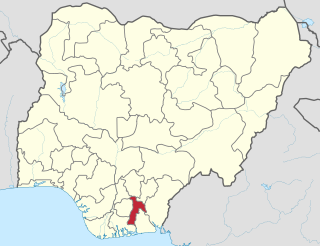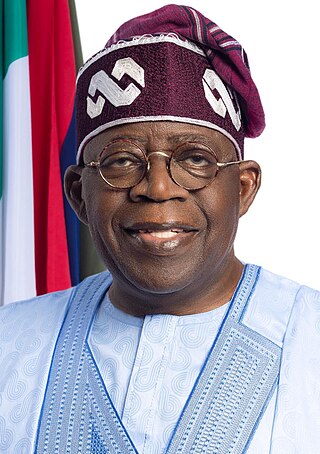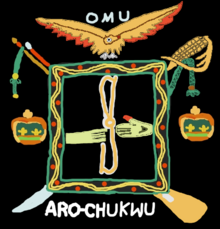
The Igbo people are an ethnic group in Nigeria. They are primarily found in Abia, Anambra, Ebonyi, Enugu, and Imo States. A sizable Igbo population is also found in Delta and Rivers States. Igbo is also considered a very minority tribe in states such as Benue, Kogi, Akwa Ibom and Edo. Ethnic Igbo populations are found in Cameroon, Gabon, and Equatorial Guinea, as migrants as well as outside Africa. There has been much speculation about the origins of the Igbo people, which are largely unknown. Geographically, the Igbo homeland is divided into two unequal sections by the Niger River—an eastern and a western section. The Igbo people are one of the largest ethnic groups in Africa.

Abia State is a state in the South-East geopolitical zone of Nigeria, it is bordered to the northwest by Anambra State and northeast by the states of Enugu, and Ebonyi, Imo State to the west, Cross River State to the east, Akwa Ibom State to the southeast, and Rivers State to the south. Abia is the only Southeastern state that has boundaries with the other four Southeastern states in Nigeria. It takes its name from the acronym for four of the state's most populated regions: Aba, Bende, Isuikwuato, and Afikpo. The state capital is Umuahia while the largest city and commercial centre is Aba.
Arochukwu Local Government Area, sometimes referred to as Arochuku or Aro Oke-Igbo, is the third largest local government area in Abia State in southeastern Nigeria and homeland of the Igbo subgroup, Aro people.
Arondizuogu (Aro-ndizuogu) is a town inhabited by the Igbo subgroup of the Aro people in Imo State of Nigeria. The Arondizuogu community is believed to have migrated from Arochukwu in the present Abia State to their current settlements in Imo state, which include the Okigwe, Ideato North and Onuimo local governments. However, others of Aro descent are in other local governments in Imo State.

Igboland, also known as Southeastern Nigeria, is the indigenous homeland of the Igbo people. It is a cultural and common linguistic region in southern Nigeria. Geographically, it is divided into two sections by the lower Niger River: an eastern and a western one. Its population is characterised by the diverse Igbo culture and the speakers of equally diverse Igbo languages.

The Aro Confederacy (1640–1902) was a political union orchestrated by the Aro people, an Igbo subgroup, centered in Arochukwu in present-day southeastern Nigeria. The Aro Confederacy kingdom was founded after the beginning of the Aro-Ibibio Wars. Their influence and presence was all over Eastern Nigeria, lower Middle Belt, and parts of present-day Cameroon and Equatorial Guinea during the 18th and 19th centuries. The Arochukwu Kingdom was an economic, political, and an oracular center as it was home of the Ibini Ukpabi oracle, High Priests, the Aro King Eze Aro, and central council (Okpankpo). The Aro Confederacy was a powerful and influential political and economic alliance of various Igbo-speaking communities in southeastern Nigeria. It emerged during the 17th century and played a significant role in the region until the late 19th century.

Nigeria has 774 local government areas (LGAs), each administered by a local government council consisting of a chairman, who is the chief executive, and other elected members, who are referred to as councillors. Each LGA is further subdivided into a minimum of ten and a maximum of twenty wards. A ward is administered by a councillor, who reports directly to the LGA chairman. The councillors fall under the legislative arm of the Local Government, the third tier of government in Nigeria, below the state governments and the federal government.
The Aro-Ibibio Wars were a series of conflicts between the Aro people and a Ibibio in present-day Southeastern Nigeria at Ibom Kingdom from 1630 to 1902. These wars led to the foundation of the Arochukwu kingdom.
Nnachi Ipia monomously known as Nnachi, was one of the founding fathers of the city of Arochukwu, one of the largest villages in Abia State in southeastern Nigeria. During the conclusion of the 17th century, he was a Dibia (priest-doctor) from the Edda people near Afikpo. The Eze Agwu clan led by his relative King Agwu Inobia in the Aro region called on Nnachi for help during the Aro-Ibibio Wars. Unable to break the stalemate in the favor of Eze Agwu, Nnachi called some allies from the east of the Cross River known as the Akpa people. Akuma and Osim Nnubi led the Akpa people into the Aro region and collaborated with Igbo forces to defeat the Obong Okon Ita kingdom. Though Osim died, Akuma survived and became the first EzeAro. After his death, Nnachi's descendants took over the throne starting with his son, Oke Nnachi. They are currently the ruling clan of the Aro people.
Aro History starts from Ibibio migration to the present Arochukwu area.
Ubakala is a large town in Umuahia South Local Government Area (LGA) of Abia State, Nigeria. It is one of the major ancient clans of Umuahia. A popular market for which it is known is the Apumiri Market. Umuahia South Local Government Area Headquarters is located at Apumiri as well. Ubakala is situated southwards of Umuahia main township. Its well defined boundaries geographically places it at the North of Ntigha.
The Isu people are the second largest group of the Igbo people of Nigeria. Isuama, in which the purest Igbo is said to be spoken, is to be found the heart of the Igbo nationality; consequently it is quite reasonable to look among its people for the original fountain-head from which all the other clans have sprung. This inference too is supported not only by the purity of the language, but by this right of dispensing or rather of confer-ring royalty which is undoubtedly the prerogative of the Nri or N'shi people. In the pre-colonial era, the Igbo people were protected from external invasion by the dense forests of the region, which also had the effect of encouraging diversity. Thus as warriors the neighboring Oratta (Uratta) people looked down on the Isu people, who were traders.
Abam is a populated Igbo clan in Abia state. It is located in Arochukwu/Ohafia federal constituency of Nigeria. Abam is the biggest clan by population and landmass in Arochukwu LGA, and one of the biggest clan in Abia North senatorial district.
The South East is the one of the six geopolitical zones of Nigeria representing both a geographic and political region of the country's inland southeast. It comprises five states – Abia, Anambra, Ebonyi, Enugu, and Imo.
Nkporo is a town in Abia State, in southeastern Nigeria, traditionally an Igbo speaking region. It is in the Ohafia Local Government Area.
Oboro is the largest of four clans in Ikwuano Local Government Area of Abia State, Nigeria. It is bounded to the north by Ibeku and Bende clans, west by the Olokoro and Ngwa, east by Ibere and south by the Isuogu. Oboro was classified in the Ohuhu-Ngwa cluster of the Southern Igbo area by British anthropologists Forde and Jones. It is also one of 18 Igbo clans in the Old Bende Division of the defunct Owerri Province. The Oboro speak a common language with the other 17 clans of the Bende Division though dialectal variations exist. These clans share a history of inter-ethnic relations.
Ibere is a clan located in the eastern part of Ikwuano Local Government Area, Abia State, Nigeria. It borders Oboro to the west, Bende to the north, the Isuogu to the south, Itumbauzo and Nkari to the east. It is one of 18 Igbo clans of the Old Bende Division. Ibere was classified in the Ohuhu-Ngwa cluster of the Southern Igbo area by Forde and Jones.

The 2023 Nigerian presidential election in Abia State will be held on 25 February 2023 as part of the nationwide 2023 Nigerian presidential election to elect the president and vice president of Nigeria. Other federal elections, including elections to the House of Representatives and the Senate, will also be held on the same date while state elections will be held two weeks afterward on 11 March.
Ariam/Usaka is one of the four principal clans of Ikwuano Local Government Area, Abia State, Nigeria. Ariam/Usaka belongs to the Isuogu family. Ariam itself is made up of three subgroups namely; Ariam, Ekpiri and Usaka. This clan borders Ibere and Oboro to the north, Oloko to the west, as well as several Ibibio communities in Akwa Ibom State to its eastern and southern borders. Forde and Jones categorized the Isuogu family in the Ohuhu-Ngwa cluster of the Southern Igbo area.
The 2023 Nigerian House of Representatives elections in Abia State was held on 25 February 2023, to elect the 3 House of Representatives members from Abia State, one from each of the state's three senatorial districts. The elections will coincide with the 2023 presidential election, as well as other elections to the House of Representatives and elections to the Senate; with state elections being held two weeks later. Primaries were held between 4 April and 9 June 2022.






